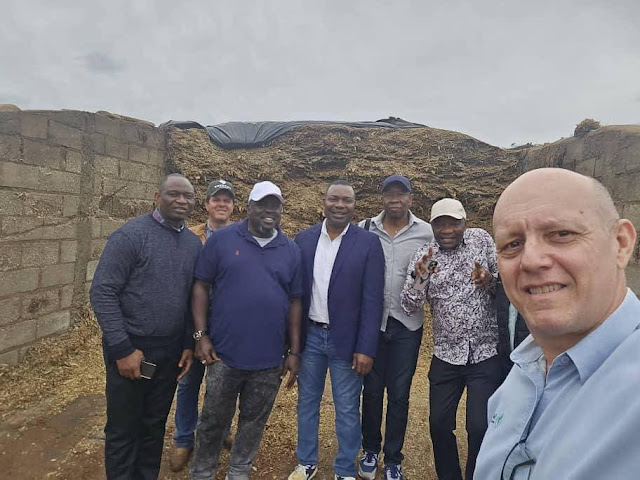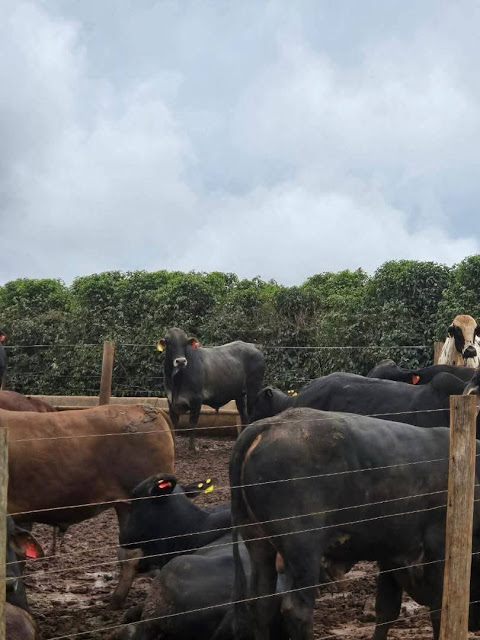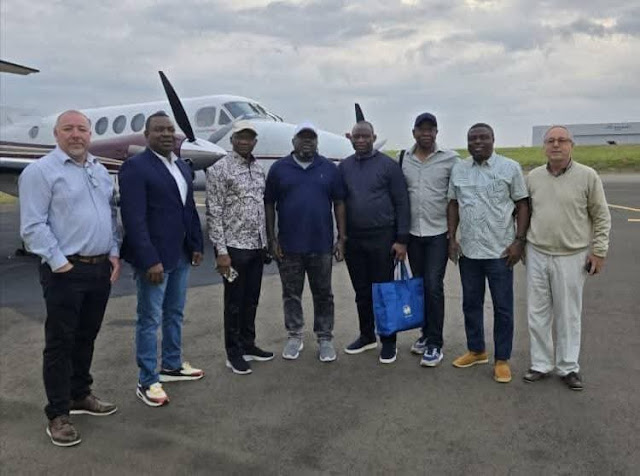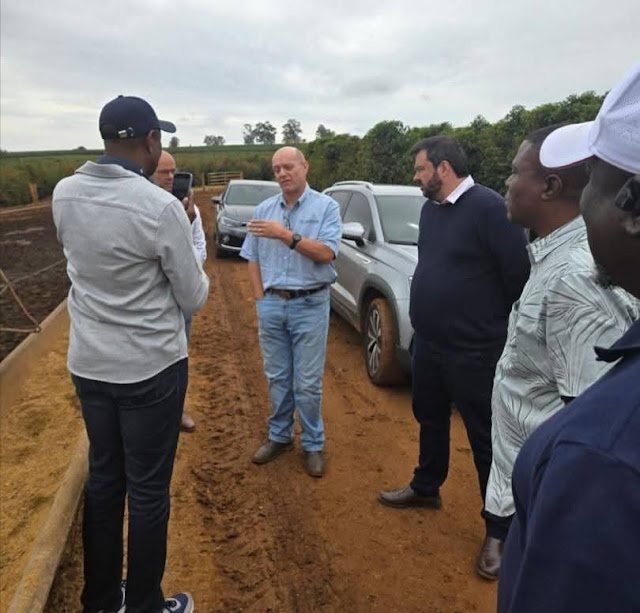In a bold move to revolutionize Delta State’s agricultural sector, Governor Sheriff Oborevwori has initiated a transformative partnership with Brazilian farming experts, directing a high-level delegation to visit one of Brazil’s most advanced and innovative ranches. This strategic visit underscores the governor’s commitment to diversifying Delta State’s economy, ensuring food security, and creating sustainable employment opportunities for its citizens. The delegation’s tour, which focused on modern agricultural practices and potential areas of collaboration, signals a new era of agribusiness development in Delta State, Nigeria, with far-reaching implications for the region and the continent.
A Vision for Agricultural Transformation
Delta State, located in Nigeria’s oil-rich Niger Delta region, has long been a hub of economic activity, primarily driven by crude oil production. However, with global shifts toward sustainable economies and the need to reduce dependence on non-renewable resources, Governor Oborevwori has prioritized economic diversification as a cornerstone of his administration. Agriculture, with its vast potential to create jobs, ensure food security, and drive inclusive growth, has emerged as a key focus area. Recognizing Brazil’s global leadership in modern agriculture, particularly in livestock and ranching, the governor saw an opportunity to learn from and collaborate with one of the world’s agricultural powerhouses.
Brazil’s agricultural sector is renowned for its innovation, efficiency, and scale. The country is a global leader in beef and dairy production, with advanced techniques in cattle breeding, pasture management, and agro-processing. By leveraging Brazil’s expertise, Delta State aims to transform its agricultural landscape, positioning itself as a leading agribusiness hub in Nigeria and West Africa. The governor’s directive to send a delegation to Brazil reflects a proactive approach to adopting global best practices and fostering international partnerships to achieve these goals.
The Delegation’s Mission
The Delta State delegation, led by Dr. Barry Pere Gbe, the Chief Economic Adviser to the Governor, embarked on a working tour to one of Brazil’s largest and most innovative ranches. The delegation comprised key figures in the state’s economic and agricultural sectors, including:
Ada Val Arenyeka, Commissioner for Agriculture and Natural Resources;
Charles Aniagwu, Commissioner for Works (Rural Roads and Public Information);
Samuel Oligida, Commissioner for Trade and Investment;
Hon. Anthony Elekeokwuri, Director General of the Delta State Investment Development Agency;
Barrister George Orogun, Special Adviser on Investments.
The composition of the delegation reflects the multifaceted approach of the Oborevwori administration, which seeks to integrate agriculture, infrastructure, investment, and policy to drive sustainable development. Each member brought unique expertise to the table, ensuring comprehensive discussions and a holistic understanding of the opportunities for collaboration.
During the visit, the delegation engaged in high-level discussions with the ranch’s management, toured state-of-the-art facilities, and explored potential areas of partnership. The focus areas included:
Modern Cattle Breeding: Brazil’s expertise in selective breeding and genetic improvement has made it a global leader in livestock production. The delegation studied these techniques to enhance the quality and yield of cattle in Delta State.
Livestock Management: Efficient livestock management practices, including health monitoring, feeding systems, and disease control, were key areas of interest.
Pasture Development: Brazil’s success in developing high-yield pastures that support large-scale ranching was a critical focus, given Delta State’s fertile lands and favorable climate.
Dairy Production: The delegation explored Brazil’s advanced dairy farming techniques, aiming to boost milk production and processing in Delta State.
Agro-Processing: Value addition through agro-processing was identified as a key driver of economic growth, with opportunities to develop local industries for meat, dairy, and other agricultural products.
Insights from the Delegation
Dr. Barry Pere Gbe, the leader of the delegation, emphasized the transformative potential of the partnership with Brazilian farmers. Speaking at the ranch, he highlighted Delta State’s commitment to revolutionizing its agricultural sector through strategic collaborations and the adoption of global best practices. “Brazil is renowned for its advancements in livestock and ranching, and we believe that collaboration in this sector will bring immense benefits to our people,” Dr. Gbe stated. He underscored the governor’s vision to replicate successful Brazilian models, enhance local capacity, and attract direct investments into Delta State.
Dr. Gbe’s remarks reflect a broader strategy to leverage international expertise to address local challenges. Nigeria’s agricultural sector has faced significant hurdles, including low productivity, limited access to modern technology, and insufficient investment. By learning from Brazil’s success, Delta State aims to overcome these challenges and create a robust, sustainable agricultural ecosystem. The delegation’s visit was not merely a fact-finding mission but a strategic step toward building long-term partnerships that will drive economic growth and job creation.
Other members of the delegation echoed Dr. Gbe’s sentiments, reaffirming Governor Oborevwori’s commitment to economic diversification. Commissioner Ada Val Arenyeka emphasized the importance of modernizing agriculture to ensure food security and reduce dependence on imports. “Delta State has vast arable land and a youthful population eager to engage in agriculture. By adopting modern techniques and fostering partnerships, we can unlock the sector’s full potential,” he noted.
Commissioner Charles Aniagwu highlighted the role of infrastructure, particularly rural roads, in supporting agricultural development. Improved road networks would facilitate the transportation of agricultural produce, reduce post-harvest losses, and connect farmers to markets. Meanwhile, Commissioner Samuel Oligida and Hon. Anthony Elekeokwuri focused on the investment opportunities, emphasizing the need to create an enabling environment for both local and foreign investors. Barrister George Orogun, the Special Adviser on Investments, stressed the importance of building trust with international partners to attract capital and expertise to Delta State.
Brazilian Expertise and Opportunities for Collaboration
The Brazilian hosts, led by Mr. Gustavo Monaco, expressed enthusiasm about partnering with Delta State. Brazil’s agricultural success is built on decades of innovation, research, and investment, making it an ideal partner for Delta State’s ambitions. Mr. Monaco noted Nigeria’s large market and Delta State’s fertile environment as significant advantages for agribusiness development. “We see great potential in collaborating with Delta State. Your region’s natural resources, combined with our expertise, could create a win-win partnership,” he said.
The discussions between the delegation and the Brazilian ranch management covered a wide range of topics, from investment opportunities to knowledge exchange and technology transfer. Brazil’s agricultural sector is supported by advanced technologies, including precision farming, automated feeding systems, and data-driven livestock management. By adopting these technologies, Delta State could significantly increase agricultural productivity and efficiency.
Moreover, Brazil’s experience in agro-processing offers valuable lessons for Delta State. Agro-processing not only adds value to raw agricultural products but also creates jobs and stimulates local economies. For example, Brazil’s beef and dairy industries are supported by a robust network of processing plants, which ensure that products meet international standards and reach global markets. Delta State could emulate this model by establishing processing facilities for meat, dairy, and other agricultural products, thereby creating new revenue streams and employment opportunities.
The Brazilian hosts also highlighted the importance of sustainability in modern agriculture. Brazil has made significant strides in sustainable ranching practices, such as rotational grazing and reforestation, to mitigate environmental impacts. These practices align with Delta State’s goal of promoting environmentally friendly agriculture that supports long-term economic and ecological sustainability.
Governor Oborevwori’s Vision for Delta State
The delegation’s visit to Brazil is a key component of Governor Oborevwori’s broader vision to position Delta State as a leading hub for agribusiness in Nigeria and West Africa. Since assuming office, the governor has prioritized policies and initiatives that promote economic diversification, job creation, and sustainable development. Agriculture, as one of the state’s most promising sectors, is central to this vision.
Delta State’s fertile lands, abundant water resources, and favorable climate make it an ideal location for agricultural investment. However, the sector has been hampered by challenges such as outdated farming practices, limited access to finance, and inadequate infrastructure. Governor Oborevwori’s administration is addressing these challenges through a multipronged approach that includes:
Investment in Infrastructure: The administration is prioritizing the development of rural roads, irrigation systems, and storage facilities to support agricultural productivity and reduce post-harvest losses.
Support for Local Farmers: Through subsidies, training programs, and access to modern inputs, the government is empowering local farmers to adopt best practices and increase yields.
Attracting Foreign Investment: By fostering partnerships with global agricultural leaders like Brazil, the administration aims to attract direct investments that will drive growth and innovation.
Promoting Value Addition: The focus on agro-processing reflects the governor’s commitment to creating value chains that maximize the economic benefits of agriculture.
Job Creation: By modernizing agriculture and developing related industries, the administration aims to create thousands of jobs, particularly for the state’s youth.
The visit to Brazil is a testament to the governor’s proactive approach to governance. By seeking international expertise, Governor Oborevwori is demonstrating a commitment to learning from global leaders and adapting their successes to the local context. This approach not only enhances Delta State’s agricultural sector but also positions the state as a model for other regions in Nigeria and beyond.
Next Steps and Expected Outcomes
Following the visit, the delegation is expected to return to Delta State with a comprehensive report and actionable recommendations for implementing pilot ranching projects and other agricultural initiatives. These recommendations will likely include strategies for:
Establishing Pilot Ranches: The delegation’s insights into Brazil’s ranching model could inform the development of modern ranches in Delta State, focusing on cattle breeding, dairy production, and pasture management.
Technology Transfer: Partnerships with Brazilian experts could facilitate the adoption of advanced technologies, such as automated feeding systems and precision farming tools.
Capacity Building: Training programs for local farmers and agricultural workers will be critical to building the skills needed to implement modern practices.
Investment Frameworks: The delegation’s report will likely outline strategies for attracting foreign and domestic investment, including incentives for private-sector participation.
Policy Reforms: Recommendations may include policy changes to create a more enabling environment for agribusiness, such as streamlined regulations and improved access to finance.
The pilot projects are expected to serve as a proof of concept, demonstrating the viability of modern ranching and agro-processing in Delta State. Successful implementation could pave the way for larger-scale initiatives, transforming the state’s agricultural sector and creating a ripple effect across the region.
Broader Implications for Nigeria and West Africa
The partnership with Brazilian farmers has implications beyond Delta State. Nigeria, as Africa’s most populous nation, faces significant challenges in achieving food security and reducing dependence on food imports. By adopting global best practices, Delta State could serve as a model for other states, demonstrating the potential of modern agriculture to drive economic growth and job creation.
Moreover, the collaboration with Brazil could position Delta State as a hub for agribusiness in West Africa. The region’s growing population and increasing demand for food present significant opportunities for agricultural investment. By leveraging its natural resources and strategic partnerships, Delta State could become a key player in the regional and global agricultural markets.
Challenges and Considerations
While the partnership with Brazil offers immense potential, it is not without challenges. Implementing modern agricultural practices in Delta State will require significant investment in infrastructure, technology, and human capital. The state must also address issues such as land tenure, access to finance, and environmental sustainability to ensure the success of these initiatives.
Furthermore, the cultural and economic differences between Brazil and Nigeria will require careful adaptation of Brazilian models to the local context. For example, Brazil’s large-scale ranching operations may need to be scaled down to suit Delta State’s land availability and market dynamics. The government will also need to engage local communities to ensure their buy-in and participation in these initiatives.
Despite these challenges, the Oborevwori administration’s proactive approach and commitment to collaboration provide a strong foundation for success. By fostering partnerships, investing in infrastructure, and supporting local farmers, Delta State is well-positioned to achieve its agricultural transformation goals.
Conclusion
Governor Sheriff Oborevwori’s directive to engage with Brazilian farmers marks a significant step toward transforming Delta State’s agricultural sector. The delegation’s visit to one of Brazil’s leading ranches has laid the groundwork for a strategic partnership that promises to bring modern techniques, investment, and expertise to Delta State. By focusing on areas such as cattle breeding, livestock management, pasture development, dairy production, and agro-processing, the state aims to unlock the full potential of its agricultural sector.
This initiative reflects a broader vision to diversify Delta State’s economy, ensure food security, and create sustainable jobs for its citizens. As the delegation prepares to return with recommendations for pilot projects, the stage is set for a new era of agribusiness development in Delta State. With continued commitment and strategic implementation, Delta State could emerge as a leading hub for agriculture in Nigeria and West Africa, setting an example for other regions to follow. The partnership with Brazil is not just a collaboration between two regions—it is a bold step toward a more prosperous, sustainable, and food-secure future for Delta State and beyond.









